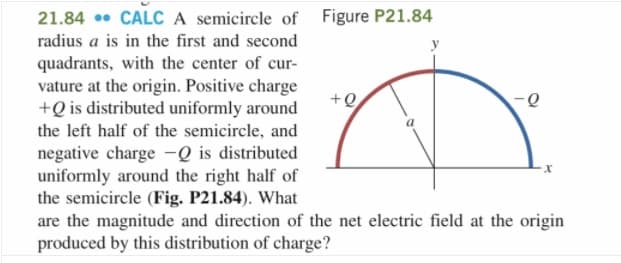21.84 • CALC A semicircle of Figure P21.84 radius a is in the first and second quadrants, with the center of cur- vature at the origin. Positive charge +Q is distributed uniformly around the left half of the semicircle, and negative charge -Q is distributed uniformly around the right half of the semicircle (Fig. P21.84). What are the magnitude and direction of the net electric field at the origin produced by this distribution of charge?
21.84 • CALC A semicircle of Figure P21.84 radius a is in the first and second quadrants, with the center of cur- vature at the origin. Positive charge +Q is distributed uniformly around the left half of the semicircle, and negative charge -Q is distributed uniformly around the right half of the semicircle (Fig. P21.84). What are the magnitude and direction of the net electric field at the origin produced by this distribution of charge?
Physics for Scientists and Engineers: Foundations and Connections
1st Edition
ISBN:9781133939146
Author:Katz, Debora M.
Publisher:Katz, Debora M.
Chapter24: Electric Fields
Section: Chapter Questions
Problem 34PQ: aA plastic rod of length = 24.0 cm is uniformly charged with a total charge of +12.0 C. The rod is...
Related questions
Question

Transcribed Image Text:21.84 • CALCA semicircle of Figure P21.84
radius a is in the first and second
y
quadrants, with the center of cur-
vature at the origin. Positive charge
+Q is distributed uniformly around
the left half of the semicircle, and
negative charge -Q is distributed
uniformly around the right half of
the semicircle (Fig. P21.84). What
are the magnitude and direction of the net electric field at the origin
produced by this distribution of charge?

Transcribed Image Text:In problem 21.84 of your book, University Physics 15th edition (see End of the Chapter 12 section), what is the electric field along the
x-axis at the origin?
Answer:
2
E = Q/(2
a
Expert Solution
This question has been solved!
Explore an expertly crafted, step-by-step solution for a thorough understanding of key concepts.
Step by step
Solved in 2 steps with 6 images

Knowledge Booster
Learn more about
Need a deep-dive on the concept behind this application? Look no further. Learn more about this topic, physics and related others by exploring similar questions and additional content below.Recommended textbooks for you

Physics for Scientists and Engineers: Foundations…
Physics
ISBN:
9781133939146
Author:
Katz, Debora M.
Publisher:
Cengage Learning

Principles of Physics: A Calculus-Based Text
Physics
ISBN:
9781133104261
Author:
Raymond A. Serway, John W. Jewett
Publisher:
Cengage Learning

College Physics
Physics
ISBN:
9781938168000
Author:
Paul Peter Urone, Roger Hinrichs
Publisher:
OpenStax College

Physics for Scientists and Engineers: Foundations…
Physics
ISBN:
9781133939146
Author:
Katz, Debora M.
Publisher:
Cengage Learning

Principles of Physics: A Calculus-Based Text
Physics
ISBN:
9781133104261
Author:
Raymond A. Serway, John W. Jewett
Publisher:
Cengage Learning

College Physics
Physics
ISBN:
9781938168000
Author:
Paul Peter Urone, Roger Hinrichs
Publisher:
OpenStax College

Physics for Scientists and Engineers, Technology …
Physics
ISBN:
9781305116399
Author:
Raymond A. Serway, John W. Jewett
Publisher:
Cengage Learning

College Physics
Physics
ISBN:
9781285737027
Author:
Raymond A. Serway, Chris Vuille
Publisher:
Cengage Learning

College Physics
Physics
ISBN:
9781305952300
Author:
Raymond A. Serway, Chris Vuille
Publisher:
Cengage Learning